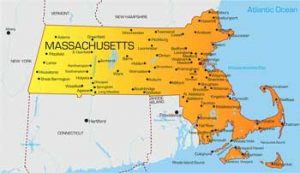Report: Massachusetts is healthiest state
 Massachusetts jumped up a spot and is now designated as the healthiest state, according to a report from America’s Health Rankings.
Massachusetts jumped up a spot and is now designated as the healthiest state, according to a report from America’s Health Rankings.
The 171-page report from the United Health Foundation and American Public Health Association takes into consideration 35 measures for policy, clinical care, behaviors, community and environment.
The overall rankings for the other New England states are as follows: Vermont, third; Connecticut, fifth; New Hampshire, eighth; Rhode Island, eleventh; and Maine, twenty-third.
Massachusetts achieved the slot based on high marks for having the highest concentration of mental health providers (547.3 per 100,000 population), more than 200 primary care physicians and more than 80 dentists per 100,000 people.
It also scored high for reduced smoking prevalence 25 percent in the past five years–from 18.2 percent in 2012 to 13.6 percent in 2017.
Other laudable factors included having the lowest percentage of uninsured residents at 2.7 percent, a low prevalence of obesity and a 38 percent decrease in the number of children living in poverty–from 17.6 percent to 11 percent–over the past two years.
The number of cancer deaths decreased in both Massachusetts and Connecticut.
However, Massachusetts is plagued by a high drug death rate which increased 69 percent or an additional 8.1 deaths per 100,000 population.
Other New England states also experienced jumps in the number of drug-related deaths with New Hampshire’s rate increasing by 118 percent (additional 13.2 deaths per 100,000 population) and Rhode Island having a rise by 56 percent (additional 8.9 deaths per 100,000 population).
Despite its number one status, Massachusetts was also challenged by a high preventable hospitalization rate and a large disparity between health status by educational attainment.
In terms of the number of mental health providers, the other New England states ranked well with Maine placing third, (442.1 per 100,000 population), Vermont in fourth (407.3), Rhode Island in sixth (375.0), Connecticut in ninth (354.8) and New Hampshire in fifteenth (273.8).
However, the report cited the fact that access to mental health care is limited in rural areas where 20 percent of the population lives but only 10 percent of psychologists and psychiatrists reside.
Across the nation, the report also cites disturbing trends in mortality. Since 2015, premature deaths (the number of years of potential life lost before age 75) increased by three percent or 217 years lost and cardiovascular deaths are up by two percent.
Over the past year, drug deaths have risen by seven percent.
In a statement, Governor Charlie Baker said, “This report highlights the notable progress that our state is making to improve the health and well-being of every individual living in the Commonwealth.”
Overall, Alabama has the lowest concentration of mental health care providers at 85 per 100,000 population.
Rounding out the top five are Hawaii, second place after five years at number one and Utah in fourth.
Nation-wide, Mississippi ranked last.
